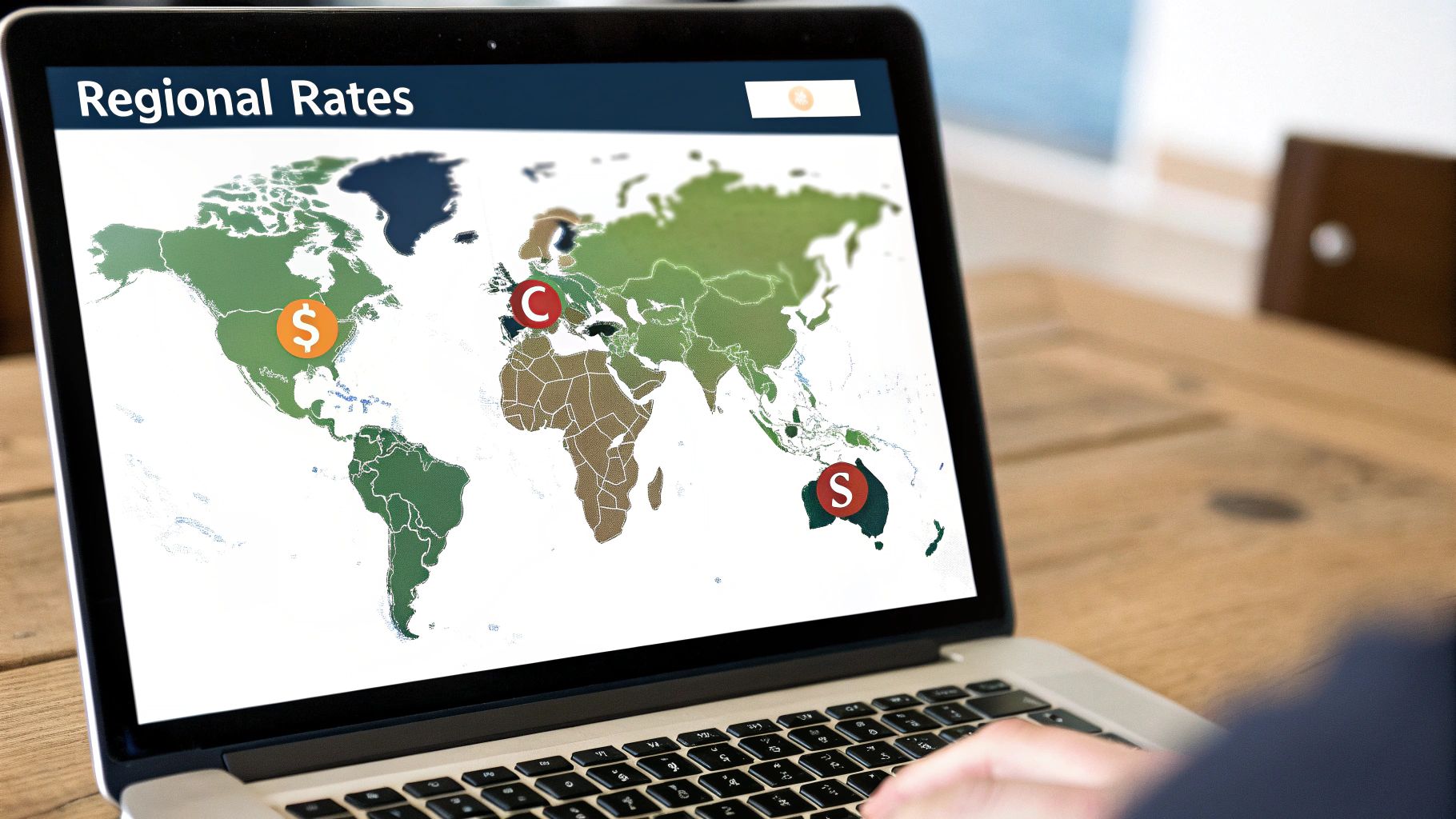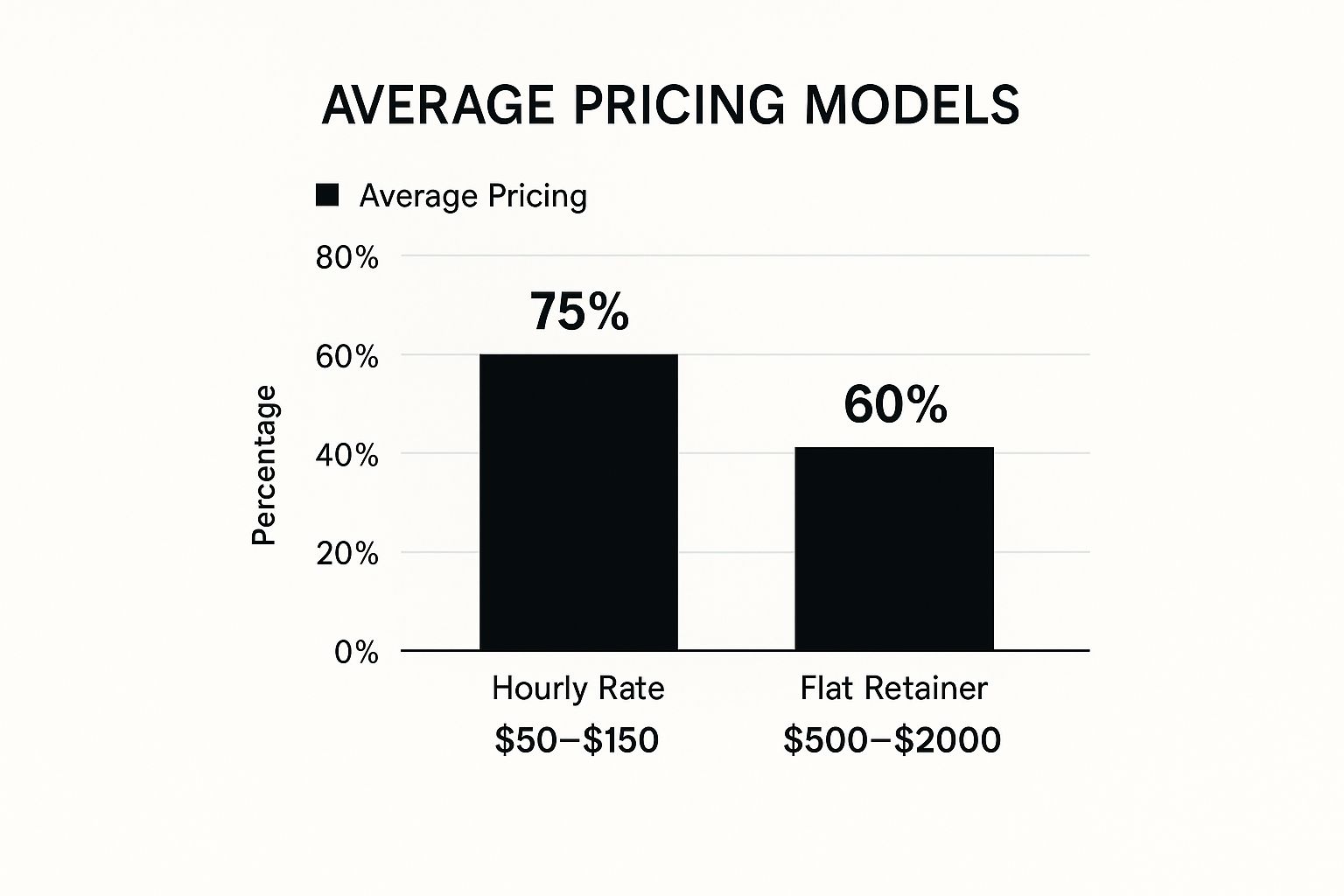One of the first questions people ask is, “How much will this actually cost?” In the UK, you can expect a private investigator’s hourly rate to be somewhere between £50 and £55. But that’s just a ballpark figure.
The reality is, pricing can be as low as £29.50 per hour for more routine tasks or climb to over £200 per hour for investigations requiring a rare or highly specialised skillset. It all comes down to the specifics of your case.
Unpacking Private Investigator Costs

Figuring out the cost of a private investigator isn’t like looking at a price list in a shop. The final bill is a unique blend of different factors, a bit like commissioning a piece of art. The time, skill, and resources required will ultimately shape the price.
At its core, the nature of your case is the biggest driver. A relatively simple task, like tracing an old friend where you already have good starting information, is worlds away from a complex corporate fraud case. The latter might involve deep-diving into digital forensics, conducting lengthy surveillance, and navigating legal complexities—all of which demand more time, specialist expertise, and advanced equipment. Naturally, this is reflected in the cost.
Estimated Private Investigator Costs in the UK by Service
To give you a clearer idea of what to expect, here’s a quick reference table outlining typical costs for common services. These figures are estimates, of course, but they offer a solid starting point for budgeting your investigation.
| Service Type | Typical Pricing Model | Estimated Cost Range (£) |
|---|---|---|
| Surveillance | Hourly Rate + Expenses | £45 – £95 per hour |
| Background Checks | Fixed Fee | £200 – £750 |
| Tracing Missing Persons | Fixed Fee / Hourly | £150 – £1,000+ |
| Infidelity Investigation | Hourly / Package | £500 – £3,000+ |
| GPS Vehicle Tracking | Weekly / Monthly Fee | £300 – £600 per week |
As you can see, the variability is significant. The specific details of your situation will determine where on that spectrum your costs might land. While the average hourly rate hovers around £50 to £55, remember the full range stretches from as little as £29.50 up to £200 for the most complex work.
Getting a handle on these foundational costs is the first step. For a complete overview of what’s involved from start to finish, our detailed guide provides more context on how much it costs to hire a private investigator.
Understanding How Investigators Bill for Their Services
When you’re trying to figure out how much a private investigator costs, it’s about more than just a single hourly figure. It’s about getting to grips with how they structure their fees. Not every investigator bills the same way, and understanding their methods is key to keeping your budget in check.
It’s a bit like hiring a tradesperson. You’d probably agree a fixed price for a straightforward job like hanging a door, but for something unpredictable, like tracing a mysterious leak, you’d expect to pay by the hour. Private investigators work on very similar principles, choosing a billing structure that matches the nature of the job.
Hourly Rates for Flexible Cases
The most common way investigators charge is by the hourly rate. This model is perfect for cases where it’s impossible to know how long the work will take. Think of things like surveillance, tracking someone’s movements, or conducting detailed interviews – the time needed can change dramatically depending on what the investigator uncovers.
You simply pay for the time your investigator spends on the case. While this gives you a lot of flexibility, it also means the final bill can be hard to predict. A good, professional investigator will always give you a solid estimate of the hours they think they’ll need and keep you in the loop to make sure costs don’t get out of hand.
Fixed Fees for Predictable Tasks
For jobs with a very clear beginning and end, investigators often prefer a fixed-fee or flat-rate model. This is the “hanging a door” equivalent in the investigation world – a standard, predictable service for a set price. The biggest advantage here is that you know exactly what you’ll be paying from day one.
Tasks that usually come with a fixed fee include:
- Basic Background Checks: Confirming someone’s employment history or checking for a criminal record.
- Document Retrieval: Getting hold of specific public records, like property deeds or marriage certificates.
- Simple Tracing: Finding someone when you already have a fairly recent known address.
This approach is ideal when your needs are clear-cut, as it completely removes any guesswork about the final cost. Knowing the full scope of what private investigators do can help you see if a fixed-fee service is the right fit for your situation.
The Role of the Retainer
No matter which billing method is used, almost all investigators will ask for an upfront payment known as a retainer. This isn’t an extra charge; it’s a deposit that the investigator holds in a trust account. As they work, they deduct their hourly fees and any expenses from this initial amount.
You can think of a retainer like topping up a pay-as-you-go mobile. The investigator draws down from the balance as they work. If there’s any credit left when the case is closed, it’s refunded to you.
If the case goes on longer than expected and the initial retainer runs out, you’ll likely be asked to top it up. This system is fair for everyone involved – it ensures the investigator is paid for their work as it happens and keeps the process transparent for you. Always make sure you get a clear agreement outlining how your retainer will be managed.
Key Factors That Influence Investigation Costs

So, why does a simple address search cost so much less than a week-long surveillance operation? It all boils down to a handful of key variables that directly shape the final price tag. Getting to grips with these factors will help you understand any quote you receive and see the real value behind the numbers.
Think of it like getting a bespoke suit made. The quality of the fabric, the tailor’s years of experience, and the intricacy of the design all contribute to the final cost. The same principle applies when figuring out what a private investigator will charge.
Case Complexity and Scope
By far the biggest driver of cost is the complexity of your case. A straightforward task with a clear goal and solid starting information is always going to be more affordable than a tangled, multi-layered investigation.
Let’s break it down with a few examples:
- Low Complexity: Think of a simple database search to confirm someone’s current address or a basic background check on a potential new hire. These tasks are usually quick and don’t tie up a lot of resources.
- Medium Complexity: A matrimonial or infidelity investigation is a good example. This might involve several days of surveillance, needing one or two agents to discreetly follow a person and document their activities.
- High Complexity: At the top end, a corporate fraud case could demand weeks of intensive work. This might involve digital forensics, multiple surveillance teams, undercover operatives, and deep financial analysis.
Ultimately, the more time, people, and resources your case needs, the higher the bill will be. Understanding the full scope of what a private investigator can do helps to explain why certain services naturally come with a higher price.
Investigator Experience and Specialisation
Just like a top surgeon commands a higher fee than a GP, an investigator’s background and specific expertise play a massive role in their rates. A seasoned ex-police detective with decades of surveillance experience will justifiably charge a higher hourly rate than someone new to the field.
An experienced investigator might have a higher hourly rate, but their skill often means they can solve a case in far fewer hours. That efficiency can actually save you money in the long run.
Likewise, investigators who specialise in niche areas like cybercrime, financial forensics, or technical surveillance counter-measures (bug sweeping) possess skills that are in high demand. Their pricing naturally reflects that advanced expertise.
Technology and Equipment Required
Today’s investigations often lean heavily on sophisticated gear, and the cost of deploying these tools is factored into the price. This isn’t just about a long-lens camera; it can include everything from GPS tracking devices and covert audio recorders to specialised software for recovering deleted data.
In the UK, the average hourly rate for a private investigator sits around £70, but this can range anywhere from £45 to £150. The variation often comes down to the investigator’s experience and the equipment needed for the job. Agencies that invest in the latest technology often have to price their services higher to cover those significant operational costs.
Geographic Location
Finally, where the investigation happens really matters. A case based in a major city like London or Manchester will almost always cost more than the same job in a quiet, rural town.
This isn’t just about city prices. It’s because the operational costs—travel, fuel, and simply the cost of doing business—are higher. An investigator navigating a dense urban environment also faces far more logistical challenges, which can demand more time and resources to overcome.
Looking Out for Hidden Fees and Extra Expenses

When you first get a quote from a private investigator, it helps to see the hourly rate or fixed fee as just the starting point. Think of it like a garage quoting you for labour—the final bill will naturally include the cost of parts. In the same way, an investigator’s initial estimate rarely covers all the operational costs needed to get the job done right.
These extra costs aren’t about an agency trying to pull a fast one; they’re simply the real-world, variable expenses that crop up during an investigation. Any professional worth their salt will be upfront about these potential charges from day one. Knowing what they are helps you set a realistic budget and avoids any nasty shocks when the final invoice arrives.
To really understand how much a private investigator costs, you have to look beyond the headline number and consider all the smaller, essential outgoings that make the work possible.
Common Additional Costs to Expect
While no two cases are the same, a few standard expenses tend to appear on most bills. These are costs directly tied to the legwork your investigator is doing for you.
Here are some of the most frequent additional fees you’ll encounter:
- Mileage and Fuel: If the case involves surveillance or travel, investigators usually charge a standard per-mile rate. This covers not just petrol, but also the general wear and tear on their vehicle.
- Travel Time: The clock is often running during travel to and from key locations for your case. This is typically billed at the investigator’s standard hourly rate.
- Database Access Fees: Investigators have access to powerful, professional-grade databases the public can’t use. These systems charge for every search, a cost that is passed on to the client. This is a big part of tracing work, as you can see in our guide to tracing telephone numbers in the UK.
- Official Reports and Documents: If we need to get certified copies of things like birth certificates, court records, or property deeds, there will be official fees to pay.
- Court Appearances: Should your investigator need to testify in court on your behalf, their time for preparation and attendance will be billable.
The mark of a true professional is complete transparency. A reputable agency will give you a clear breakdown of potential fees and will never run up significant expenses without getting your approval first. This way, you always stay in the driver’s seat when it comes to the budget.
Questions to Ask About Extra Costs
To make sure everyone is on the same page, it’s a good idea to have a specific chat about additional expenses right at the start, during your first consultation. Taking this direct approach builds trust and gives you a solid grasp of the total potential cost.
Use this simple checklist to guide that conversation:
- Can you give me a full list of potential extra expenses for a case like mine?
- What are your rates for mileage and travel time?
- Are there any search fees for the databases you use?
- What would it cost if you need to buy official reports or documents?
- How do you handle expense approval? Will you let me know before spending over a certain amount?
- What are your fees for court preparation and appearances?
Asking these questions leaves no room for ambiguity. It puts you in a position to budget properly and move ahead with confidence, knowing exactly what you’re paying for.
Real-World Investigation Cost Scenarios
Abstract numbers on a price list don’t mean much until you see how they apply in the real world. To get a proper feel for what a private investigator might cost, it’s best to walk through a few common situations. This helps you see exactly how the hourly rates, time spent, and any extra expenses add up to a final bill.
Let’s imagine a few scenarios you might face: tracking down a long-lost family member, investigating a partner you suspect of infidelity, or vetting a potential business partner. Each case is unique, demanding a different strategy, skillset, and of course, a different budget. Seeing the costs broken down this way provides a much clearer financial roadmap.
This infographic gives a quick overview of the most common pricing models investigators use, highlighting just how prevalent hourly rates are in the industry.

As you can see, billing by the hour is a common approach, which makes sense for cases where the duration is hard to predict. Retainers are also standard practice, acting as a deposit to secure an investigator’s time and resources.
To bring this to life, let’s explore some detailed examples.
Scenario 1: Tracing a Missing Person
Imagine you want to reconnect with an old school friend you lost touch with twenty years ago. You have their name, a rough idea of their age, and the last town you knew them to live in. This is a classic tracing case, and it’s usually quite straightforward.
An investigator will typically kick things off with in-depth database searches. These aren’t your average public records; they’re professional-grade systems that can uncover a wealth of information. If those searches don’t provide a direct hit, the next step might involve a few hours of discreet, on-the-ground enquiries in the local area.
A simple tracing case often gets wrapped up quickly, making it one of the more affordable services. The more accurate information you can provide at the start, the faster and cheaper it tends to be.
- Estimated Hours: 5-10 hours
- Hourly Rate: £55 per hour
- Potential Extras: Database access fees (£50 – £100)
- Estimated Total Budget: £325 – £650
Scenario 2: A Matrimonial Investigation
Now for a more complex and delicate matter: you suspect your spouse is having an affair. This sort of investigation almost always requires physical surveillance to gather clear, indisputable evidence, like time-stamped photos or video footage.
Most investigators will suggest an initial block of surveillance to observe your partner’s daily routine and identify any unusual patterns. This could mean having two agents work a full day, discreetly following your spouse to see where they go and who they meet.
- Estimated Hours: 10-20 hours (for the initial surveillance period)
- Hourly Rate: £60 per hour, per agent
- Potential Extras: Mileage, travel time, and costs for preparing the final report
- Estimated Total Budget: £1,200 – £2,500+
Scenario 3: A Business Background Check
Finally, let’s say you’re on the verge of a major business partnership and need to perform thorough due diligence on your potential associate. This isn’t just a quick online search; it’s a deep dive into their professional and financial history.
In this case, the investigator would verify their entire career history, search for any undeclared company directorships, check for a history of litigation or bankruptcy, and assess their overall business reputation. This is often offered as a fixed-fee service, so you know the exact cost upfront.
- Estimated Hours: N/A (Fixed Fee)
- Potential Extras: Fees for retrieving official documents from Companies House or the courts
- Estimated Total Budget: £500 – £1,500
Example Investigation Budgets: A Practical Breakdown
To put it all together, this table offers a side-by-side comparison of these scenarios. It’s a handy way to visualise how different needs can dramatically alter the final cost of an investigation.
| Investigation Scenario | Estimated Hours | Potential Additional Costs | Estimated Total Budget (£) |
|---|---|---|---|
| Simple Person Trace | 5-10 | Database searches (£50-£100) | £325 – £650 |
| Matrimonial Surveillance | 10-20 | Mileage, travel, report writing | £1,200 – £2,500+ |
| Business Background Check | Fixed Fee | Official document retrieval fees | £500 – £1,500 |
Ultimately, these examples show there’s no single answer to “how much does a PI cost?” The budget is shaped entirely by the complexity of the task, the time it takes, and the resources required to get you the answers you need.
How to Find a Reputable and Cost-Effective Investigator
When you’re looking at the cost of a private investigator, it’s easy to get fixated on the hourly rate. But let me be frank: chasing the cheapest quote is almost always a false economy. The real value isn’t in the lowest price tag, but in hiring a professional who gets you clear, usable results without wasting your time or money.
Think about it like this. A seasoned investigator might charge a higher rate but can often wrap up a case in just ten hours. A rookie, on the other hand, might offer a tempting low price but take thirty hours to get to the same point. In the end, you’ve paid more for a slower, likely more stressful, experience.
Vetting for Value and Expertise
Your focus should always be on competence first, cost second. An experienced professional doesn’t just bill for their time; they bring a wealth of knowledge, a network of contacts, and finely-honed instincts to the table. This expertise is what cuts down on billable hours and dramatically increases the chance of getting the outcome you need.
So, when you’re speaking to potential investigators, you need to do your homework. I always advise clients to:
- Verify Credentials: This is the absolute baseline. Make sure they have the proper licences and are fully insured. It’s a non-negotiable that protects you from any liability down the line.
- Check Professional Memberships: Are they part of any recognised industry associations? It’s a good sign that they’re committed to ethical practices and are serious about their profession.
- Read Client Reviews: Dive into what past clients are saying. You’re looking for consistent feedback about their professionalism, communication, and—most importantly—their ability to deliver results.
An investigator’s real value lies in their ability to resolve your case quickly and professionally. Paying a higher rate for a skilled operative who gets the job done in less time is the smartest financial decision you can make.
Finding a Good Investigator
Ultimately, making a smart choice comes down to looking at the bigger picture of value, not just the initial quote. A trustworthy investigator will be completely open about their pricing and give you a realistic idea of the time your case might take.
If you want to dig deeper, learning how to find a good private investigator is the essential next step. It ensures your investment gets you the answers you’re paying for.
By shifting your mindset from the hourly rate to the investigator’s overall efficiency and reputation, you put yourself in the best position to hire someone who delivers genuine value. That, right there, is the true meaning of a cost-effective service.
Common Questions About Private Investigator Costs
When you’re thinking about hiring a private investigator, a few key questions about money and budgets almost always come up. Getting straight answers to these is the first step towards feeling confident about the process. Let’s tackle the top three things people usually ask.
Can I Set a Budget Cap for an Investigation?
Absolutely. In fact, it’s a standard and highly recommended practice. You can, and should, set a firm budget with your investigator right from the start.
Think of it as a ‘not to exceed’ limit. They’ll work within that amount and give you a heads-up when they’re getting close to it. This puts you firmly in control, letting you decide if you want to extend the budget based on what they’ve found or wrap things up.
Setting a budget cap is your most important tool for managing the cost of an investigation. It prevents any nasty surprises and keeps the work aligned with what you’re prepared to spend.
Do I Need to Pay for Everything Upfront?
Not at all. You won’t be expected to pay the full estimated cost before the work even begins. The standard approach is to pay an initial retainer.
This retainer works like a deposit. The investigator bills their time and any expenses against it. Once the investigation is finished and you have your final report, you’ll settle the remaining balance.
Are Initial Consultations Free?
Yes, they should be. Almost every reputable private investigator in the UK will offer a free, no-obligation initial consultation. This is your opportunity to confidentially lay out your situation, hear how they would approach it, and get a clear cost estimate without any pressure to commit.
At UK Private Investigators, we believe in clear, upfront pricing and offer confidential consultations to help you find the answers you need. Contact us today to discuss your case.

